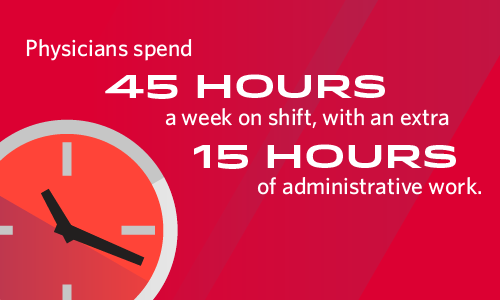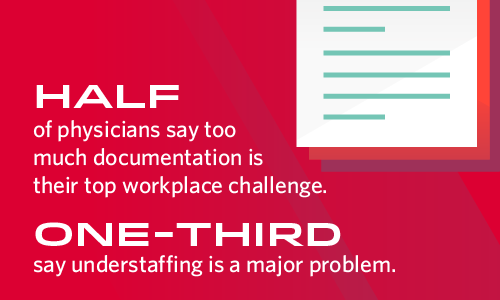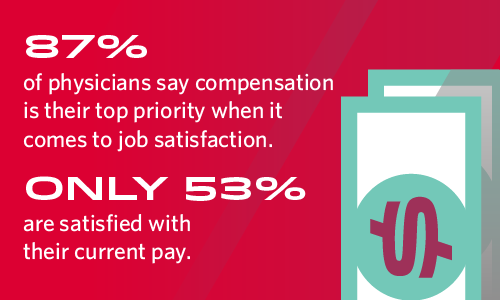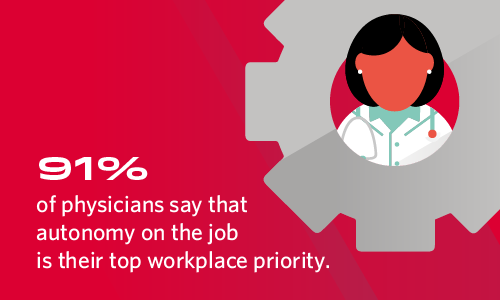What physicians really think about their work—and how locums can improve job satisfaction
November 18, 2025
Today’s realities of practicing medicine often look very different from what many physicians envisioned at the start of their careers. Long hours, mounting administrative tasks, and uncertainty about the future weigh heavily on the profession.
The latest Physician Sentiment Survey, conducted by CHG Healthcare in partnership with Hanover Research, asked 920 practicing physicians across the U.S. how they feel about their work, leadership, technology, and the economy. The results paint a complex picture: Most physicians still find satisfaction in their roles, but many are struggling with challenges that threaten both their well-being and their long-term engagement.
One solution that physicians are discovering is locum tenens work, which allows physicians to practice medicine while also providing them with work-life balance, schedule flexibility, and reduced administrative burden.
Heavy workloads and economic pressures are creating burnout
The survey found that physicians are struggling under massive workloads, spending an average of 45 hours a week on shift, with an additional 15 hours on administrative tasks.

It’s no surprise that many respondents in the survey cited lack of time with patients—and lack of time for themselves—as major contributors to burnout.
Economic instability is also contributing to physicians’ stress. About half of physicians surveyed (45%) said they’re highly concerned about the economy’s impact on their careers and futures. Sixty-four percent reported feeling more worried about financial stability than they did a year ago. For some, those fears became reality.
For physicians, the toll is real. Dr. Gregory Kloehn, an interventional cardiologist, remembers just how demanding his schedule was before his hospital closed.
“I was working very hard, but apparently the hospital itself was not doing that well,” Dr. Kloehn recalls. “Out of the blue, they decided to close the hospital. When that happens, you’re thrust into a situation where you’re having to scramble for a new job, and you want to stay local and in your house.”
I was working 14 hours a day, typically doing a lot of different procedures and seeing a lot of patients, and working at two hospitals.
Physicians like Dr. Kloehn highlight how vulnerable even hardworking, high-demand specialists can be to economic shifts and institutional decisions beyond their control.
Is locums right for you? The pros and cons of locum tenens
Locums work can minimize administrative frustrations
Survey respondents ranked documentation and administrative tasks as the top workplace challenge. Half of them said they spend too much time on paperwork, while 35% pointed to understaffing as a persistent problem.

Dr. Robert Biggers, a urologist who transitioned into locum tenens work after decades in private practice, says he quickly noticed the difference.
“The biggest difference between a locum assignment and being in private practice is the amount of administrative responsibilities,” he shares. “Other than keeping up with your electronic medical records, there really isn’t anything. I’m not on any committees. I’m not responsible to the hospital administration for anything other than just my own conduct. It’s like night and day, and that’s just the hospital side.”

The biggest difference between a locum assignment and being in private practice is the amount of administrative responsibilities.
He adds, “My partners from when I was in private practice are dealing with all the insurance companies and different boards from the state medical society. They’re so busy doing administrative tasks that it wears them down. They’re all getting burned out.”
His words echo what the data shows; the sheer volume of non-clinical work is draining physicians and diminishing satisfaction across the board.
Compensation drives physician job satisfaction
While most physicians value autonomy and respect, compensation continues to be one of the most important drivers of satisfaction. In the survey, 87% listed compensation as a top priority, with only half (53%) being satisfied with their current pay.

Physicians worried about pay can consider supplementing their work with locums, which typically out-earn traditional staff positions.
“Compared to my private practice, I’m making probably at least twice as much working locums,” Dr. Biggers says. “I can work two weeks and bring home about the same amount that I was netting from private practice with half the time and a lot less of the administrative headaches.”
Earn more with locums: How locum tenens pay allows physicians to live their best lives
Autonomy and flexibility are key to well-being
Respect for physician autonomy ranked as the number one workplace priority in the survey, with 91% of respondents saying it mattered most to them. Yet a significant gap exists between the autonomy physicians want and what they actually experience.

For some, locum tenens work offers a way to reclaim control over their careers. Dr. Maurice Sholas, a pediatric rehabilitation specialist, says practicing locums gave him the freedom to continue caring for patients while pursuing other passions.
“The reason options like locums are so important is that you can still keep your finger on the pulse of practicing medicine, but you can do it in a way that makes room and space for all the other things in your life,” he shares. “I don’t feel less of a doctor. I don’t feel less professional because I have a contractor badge rather than a full-time badge. My patients don’t see me as any different, and I get the best of both worlds.”

You can still keep your finger on the pulse of practicing medicine, but you can do it in a way that makes room and space for all the other things in your life.
His experience underscores a broader sentiment revealed by the survey—physicians want more agency over their time, their practice, and their ability to balance medicine with other aspects of life.
Feel more balanced: How locum jobs help you achieve better work-life balance
Turning insights into action
CHG’s Physician Sentiment Survey makes it clear that while many physicians still find deep satisfaction in their work, systemic challenges continue to erode well-being. Workload, compensation, economic pressures, and leadership gaps are all barriers that demand attention from healthcare organizations.
For recruiters and administrators, the takeaway is simple: Physicians need more than just a stable job. They need support that addresses their autonomy, compensation, workloads, and trust in leadership. For physicians themselves, the data affirms what many already feel and highlights why some are choosing alternative paths, such as locum tenens, to sustain their careers on their own terms.
Read the full Physician Sentiment Survey report on the CHG Healthcare blog:
